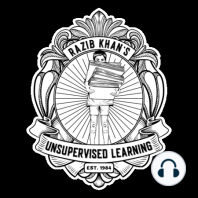56 min listen

Alexander Young: everything you want to know about cognitive genomics
Alexander Young: everything you want to know about cognitive genomics
ratings:
Length:
76 minutes
Released:
Nov 4, 2021
Format:
Podcast episode
Description
Subscribe no Give a gift subscription Share This week on the Unsupervised Learning Podcast, Razib gets into the genetics weeds again with Alex Young of the Social Sciences Genetic Association Consortium (SSGAC). They discuss the heritability of complex traits and how the SSGAC develops predictive models using genetics to tackle questions that have traditionally been the purview of social sciences (and why that’s controversial, but shouldn’t be). Alex explains how large datasets where many individuals’ whole genomes are sampled at high coverage (meaning the genome is sequenced over and over to get an accurate read) are necessary to develop the most effective complex models. This is due to the reality that most complex traits are very polygenic – controlled by numerous genes, thousands in the case of intelligence. Then they discuss the weaknesses in traditional twin studies, and Alex outlines why looking at family pedigrees more generally, particularly parents and siblings work out to be a natural controlled experiment. He foresees this as the future of complex trait analysis. Alex also discusses the statistical methods he has developed for analyzing genomes for heritability and complex traits, especially as they relate to “genetic nurture”. Transcript Razib then asks a series of clarifying questions about the nature of the research on the heritability of educational attainment based on Alex’s extensive work on the subject in Iceland. They talk about how Iceland is perhaps the ideal place to perform an experiment attempting to distinguish sociological explanations from biological ones due to its isolation and homogeneity. They conclude their conversation about genetic nurture by clearly stating that there are complex interactions between societal structures and heritable traits, but emphasize that it is becoming apparent that there is significant evidence that characteristics such as educational attainment are mediated to a large extent by genes inherited from one’s parents. While ethical, social and cultural implications are unavoidable, fearmongering about racism, eugenics and the specter of a dystopian GATTACA-like future are unhelpful and uninformed. Subscribe now Give a gift subscription
Released:
Nov 4, 2021
Format:
Podcast episode
Titles in the series (100)
Eric Cline and the End of the Bronze Age: Razib talks to archaeologists Eric Cline about his book 1177, and the end of the Bronze Age. by Razib Khan's Unsupervised Learning